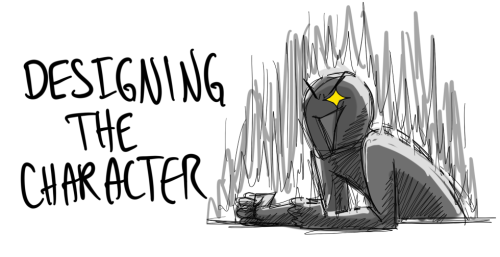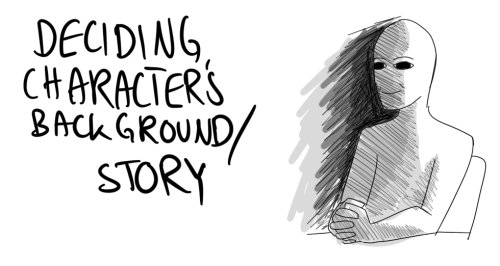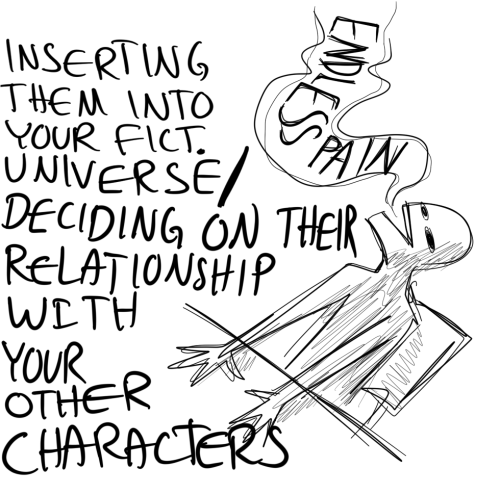Writing Resources List
Writing Resources List

I use my blog to share writing resources that I’ve collected over the years. I’ve recently gotten some new followers, so I thought I would make a list of many of these resources for easy reference.
(However, this is not a complete list of all the resources I’ve posted. For more writing resources, feel free to check out my blog.)
Encouragement for Writers
Writer’s Block & Procrastination
Writing Your Story’s Plot
How to Write a Scene
Choosing a Setting for Your Story
Character Arc & Character Development
Character Traits
How to Write Heroes & Villains
Elemental Magic & Superpowers
Writing Magic Systems
Fantasy Writing & World-Building
Writing Fight Scenes
Swords and Bows
Writing Mermaids
Writing Relationships & Romance
Romance & Relationship Prompts
+
I’m a writer, poet, and editor. I share writing resources that I’ve collected over the years and found helpful for my own writing. If you like my blog, follow me for more resources! ♡
More Posts from Sparklingsilvermagnolias and Others
Ways I Show a Character Is Grieving
They say "It’s fine, I’ve processed it" while clearly processing it through spreadsheets, sarcasm, or passive-aggressive emails.
They treat memories like landmines. They avoid certain songs, places, and foods like they bite and they kind of do.
They hoard weird things. A receipt. A voicemail. A cracked mug. Objects that wouldn’t matter to anyone else but now feel sacred.
They laugh at really inappropriate times. At funerals. In therapy. During serious conversations. It’s not funny, they just don’t know what else to do.
They forget things. Not just dates. Entire days. Their brain is buffering because it’s too full of everything they don’t want to feel.
They get too angry at tiny things. The pen runs out? Full mental breakdown. It’s never about the pen.
They say “they wouldn’t want me to be sad” as a way to guilt-trip themselves into pretending they’re not actively falling apart.
Omg omg omg. It all makes so much more sense when you realise it's not social anxiety but a fear of being perceived.
Why do you feel more comfortable with a long coat and a mask as opposed to summer clothes?
Why do you DESPISE taking pictures? Especially if it's someone else and not you taking them.
Why do you feel like you have to stop doing whatever it was you were doing when someone passes by?
Why don't you want to tell anyone how leisurely you go about your day, taking a nap, going for a snack, sitting on your phone playing games etc. because you know they will comment on it and even though it's not negative or mockery it's still feels like you've been perceived?
Why can't you make eye contact? Why can you do it only if the other person is looking away but the second when they look at you you stop listening and when you're the one speaking you can't bear to look at them because you know their eyes are on you and they are perceiving you?
Why don't you want to dress excessively or wear nicer clothes? Because you will stand out
People mistake you for shy because you don't speak often, but it's really the fear of drawing attention to yourself more than it is the things you actually say, isn't it?
Why do you hate overpopulated areas even when no one is speaking? BUT you still feel more comfortable when more than one person is in the room (but not too many!) so that the burden of being perceived is directed on someone else and you can safely lay back just observing the scene.
It's all a defence mechanism
🍀 21 Plot Twist Ideas 🍀
Stuck on your WIP? Unsure of how a scene should go? Feel as though your story is lacking substance? Enduring with the frustrations of writer’s block?
Why not try throwing in a plot twist?
A messenger brings bad news
Something important is stolen
Someone vanishes without a trace
An important item is damaged
Protagonist recognizes a face in the crowd
Someone seems to intentionally fail
Protagonist finds an item thought lost
A charitable act has a harmful result
A cruel act has a beneficial outcome
Someone unexpectedly returns the favour
A raging storm moves across town
A gift makes a character the target of a murderer
A fallen enemy makes one last attack
Only one character in danger can be saved
An enemy saves the life of Protagonist’s friend
A will from a long-lost relative appears
A secret rival seeks to replace Protagonist
A thief makes Protagonist their next target
An obscure law suddenly becomes important
Strangers mistake Protagonist for a fugitive
A tool breaks when needed most
Posture & Physical Presence For Writers
(Because how they stand can say more than how they speak.)
Upright and stiff — Formal, tense, or deeply uncomfortable. Slouched shoulders — Insecure, exhausted, or defeated. Relaxed stance — Open, comfortable, confident. Hands in pockets — Guarded, casual, or hiding something. Crossed arms — Defensive, cold, or waiting to be impressed. Leaning forward — Engaged, flirtatious, or impatient. Back straight, chin high — Proud, stubborn, or putting on a show. Shifting weight side to side — Nervous, indecisive, or stalling. Foot tapping — Anxious, impatient, or barely holding it together. Arms loose at sides — Neutral, calm, open to the moment. Fidgeting with sleeves/hair/etc. — Inner turmoil disguised as casual touch. Spine curled inward — Trying to be small, invisible, or unnoticeable. Standing too still — Suppressed emotion, discomfort, or internal freeze. Dominant stance (feet wide, chest forward) — Confidence, aggression, or showmanship. Head tilted slightly — Curiosity, confusion, or playful challenge.
I once saw someone say
There are two kinds of writers
One's an architect
And the other's a gardener
The architect plans each careful window
While the gardener simply plants a seed and watches it grow
"Which one am I?" I wondered
Then I thought, I planned a house, but I plant seeds in the foundation
The vines grow
Through the windows
And the foundations are riddled with roots
I had a plan but lo behold
The tree that grows through the roof
How Your Characters Might Flirt Using Food (Because Food = Love)
Because sometimes “I love you” sounds like “did you eat?”
“I saved the last piece for you.” → Literal affection disguised as generosity.
“This isn’t as good as the one you like, but it’s close.” → Translation: I pay attention.
“Try this. No, just—trust me.” → Feeding them is flirting. End of story.
“I remembered you don’t like onions, so I left them out.” → That’s a love letter.
“I burned it. You’re eating it anyway.” → Domestic chaos = love language unlocked.
“You always steal bites, so I got you your own.” → He saw, he adapted. Soulmate.
“You’re not allowed to fall in love with anyone who cooks better than me.” → Petty? Maybe. Adorable? Absolutely.
Hey, look at me. Look at me. I’ve said it once and I’ll say it again: you need to condition yourself to being okay with being inconvenienced by things. The first time I spoke about this I meant it in a mental health way- it is good to go out to the store and see people versus just ordering alone at home- but there is another more pressing societal issue you should be more concerned about as well.
Any service you rely on for convenience can be weaponized against you the moment you begin to rely on it. Streaming used to be a cheap and convenient way to see movies at home. It is now exorbitantly expensive, you need multiple accounts just to get what you want, and any of those movies can be taken from you at any time. And unless you have gotten used to going through the “inconvenience” of owning physical media, you can do nothing about it. Same goes for buying things on Amazon. Same goes for any service like DoorDash etc. These companies WANT you to be reliant on them for convenience so they can do whatever they want to you because, well, what else are you gonna do?
Same thing goes for the uptick in AI. If you train yourself to become reliant on AI for doing basic things, you will be taken advantage of. It is only a matter of a couple years before there are no free AI services. Not only that, but in the usage of AI’s case, it is robbing you of valuable skills that you need to curate that you will be helpless without the moment the AI companies drive in the knife the way they have done with streaming. Delivery. Cable. Internet. Etc. It will happen to AI too. And if you are not practicing skills such as. Writing. You are not only going to be at the mercy of AI companies in the digital world, but you are going to be extremely easy to take advantage of in real life too.
I am begging you to let go of learned helplessness. I am begging you to stop letting these companies TEACH you helplessness. Do something like learn to pirate. It is way more inconvenient at the beginning, but once you know how, it is one less way companies can take advantage of you. Garden. Go to the thrift store (older clothes hold up better anyway). These things take more time and effort, yes, but using time and effort are muscles you need to stretch to keep yourself from being flattened under the weight of our capitalist hellscape.
Inconvenience yourself. Please. Start with only the ways you are able. Do a little bit at a time. But do something.
Emotional Confession Scene Prompts
♡ Voice trembling on the edge of something bigger.
♡ A truth blurted out mid-argument, raw and unpolished.
♡ Avoiding eye contact, but finally saying it anyway.
♡ A confession disguised as a joke.
♡ “I wasn’t going to say anything but...”
♡ Whispered during a moment when they think the other person is asleep.
♡ A tearful outburst after staying calm for far too long.
♡ “You weren’t supposed to find out like this.”
♡ Telling the truth while staring at the ground.
♡ Letting it slip accidentally, then freezing.
♡ Writing it down instead of saying it.
♡ Starting a sentence three times before finishing it.
♡ “I didn’t know how to say it until now.”
♡ Sending a message, deleting it, sending it again.
♡ “You asked how I’m doing. I lied.”
♡ Finally saying what’s been obvious to everyone else.
♡ Speaking in metaphors because the truth feels too vulnerable.
♡ Telling someone else first.
♡ Breaking down halfway through the sentence.
♡ “I’m scared you’ll hate me if I tell you.”

This woman holds the highest recorded IQ ever: an astonishing 228. Far surpassing Einstein (160-190), Hawking (160), and Musk (155). Yet, despite her brilliance, she faced ridicule for her response to a seemingly simple problem.
But she saw what no one else could.
Here’s her story:
Marilyn Vos Savant was far from an ordinary child.
By the age of 10, she had:
• Memorized entire books
• Read all 24 volumes of the Encyclopedia Britannica
• Achieved the highest recorded IQ of 228
She seemed destined for a life of genius.
But reality took a different turn.
“No one paid much attention to me—mostly because I was a girl. And I accepted that,” Marilyn Vos Savant once said.
She attended a regular public school, left Washington University after two years to help run her parents' business, and seemed destined for an ordinary life.
But in 1985, everything changed.
The Guinness Book of World Records listed her as having the "Highest IQ" ever recorded: 228.
Suddenly, Marilyn was thrust into the spotlight:
• Featured on the covers of New York Magazine and Parade Magazine
• Guest on Late Night with David Letterman
But she couldn’t have anticipated what lay ahead.
The Rise and the Question
Marilyn joined Parade Magazine to write the iconic "Ask Marilyn" column—a dream for someone with a passion for writing.
Yet, this dream turned into a nightmare with a single question in September 1990.
The Monty Hall Problem
Named after Monty Hall, the host of Let’s Make a Deal, the question went like this:
You’re on a game show.
There are 3 doors.
• 1 door hides a car.
• The other 2 hide goats.
You choose a door. The host opens another door, revealing a goat.
Should you switch doors?
Marilyn’s answer: “Yes, you should switch.”
The backlash was overwhelming. She received over 10,000 letters, including nearly 1,000 from PhDs, insisting she was wrong:
• “You are the goat!”
• “You blew it, and you blew it big!”
• “Maybe women look at math problems differently than men.”
But was she wrong?
The Math Behind the Answer
Consider the two possible scenarios:
You pick the car (1/3 chance):
• If you switch, you lose.
You pick a goat (2/3 chance):
• Monty reveals the other goat.
• If you switch, you win.
Switching gives you a 2/3 chance of winning.
Eventually, her answer was proven correct.
Vindication
MIT ran computer simulations confirming her logic.
MythBusters tested it and reached the same conclusion.
Some academics even apologized.
So why did so many fail to see the truth?
The Reasons People Got It Wrong
• They "reset" the scenario instead of recognizing the shifting probabilities.
• The simplicity of 3 doors obscured the underlying math.
• Many assumed each remaining door had a 50% chance.
Marilyn’s View
Marilyn blamed the compulsory schooling system for discouraging independent thinking. She argued that it:
• Creates passive learners
• Stifles exploration
• Hinders critical thinking
A Blessing and a Burden
Marilyn admits that her intellect often feels isolating—there’s no one to turn to when she needs answers.
Still, she sees her intelligence as a gift, not a curse .
Please Follow Forbidden Stories
For More interesting Stories
-
 divine-champion liked this · 3 weeks ago
divine-champion liked this · 3 weeks ago -
 fhteehj liked this · 3 weeks ago
fhteehj liked this · 3 weeks ago -
 kaijuice-z liked this · 3 weeks ago
kaijuice-z liked this · 3 weeks ago -
 corallove liked this · 3 weeks ago
corallove liked this · 3 weeks ago -
 its5amgotosleep liked this · 3 weeks ago
its5amgotosleep liked this · 3 weeks ago -
 imonlyusingthisforrp reblogged this · 3 weeks ago
imonlyusingthisforrp reblogged this · 3 weeks ago -
 imonlyusingthisforrp liked this · 3 weeks ago
imonlyusingthisforrp liked this · 3 weeks ago -
 newdawnhorizon reblogged this · 3 weeks ago
newdawnhorizon reblogged this · 3 weeks ago -
 ace-coffee-drinker liked this · 3 weeks ago
ace-coffee-drinker liked this · 3 weeks ago -
 acethespace liked this · 3 weeks ago
acethespace liked this · 3 weeks ago -
 badassbitchwhosonly5ft liked this · 3 weeks ago
badassbitchwhosonly5ft liked this · 3 weeks ago -
 volturigroupie liked this · 3 weeks ago
volturigroupie liked this · 3 weeks ago -
 chiefwinnernacho liked this · 3 weeks ago
chiefwinnernacho liked this · 3 weeks ago -
 a-sa reblogged this · 3 weeks ago
a-sa reblogged this · 3 weeks ago -
 a-sa liked this · 3 weeks ago
a-sa liked this · 3 weeks ago -
 lunaluvsu4eva liked this · 3 weeks ago
lunaluvsu4eva liked this · 3 weeks ago -
 cr1ngetherapyyy reblogged this · 3 weeks ago
cr1ngetherapyyy reblogged this · 3 weeks ago -
 dreams-are-paper-thin reblogged this · 3 weeks ago
dreams-are-paper-thin reblogged this · 3 weeks ago -
 dreams-are-paper-thin liked this · 3 weeks ago
dreams-are-paper-thin liked this · 3 weeks ago -
 aghostlywh1sper reblogged this · 3 weeks ago
aghostlywh1sper reblogged this · 3 weeks ago -
 aghostlywhisper liked this · 3 weeks ago
aghostlywhisper liked this · 3 weeks ago -
 songrosedarling liked this · 3 weeks ago
songrosedarling liked this · 3 weeks ago -
 the-orion-scribe reblogged this · 3 weeks ago
the-orion-scribe reblogged this · 3 weeks ago -
 the-orion-scribe liked this · 3 weeks ago
the-orion-scribe liked this · 3 weeks ago -
 tamras-shieldmaiden reblogged this · 3 weeks ago
tamras-shieldmaiden reblogged this · 3 weeks ago -
 endless-traveler liked this · 3 weeks ago
endless-traveler liked this · 3 weeks ago -
 mari--lace reblogged this · 3 weeks ago
mari--lace reblogged this · 3 weeks ago -
 privireastelelor liked this · 3 weeks ago
privireastelelor liked this · 3 weeks ago -
 quoinie liked this · 3 weeks ago
quoinie liked this · 3 weeks ago -
 over-roaming-waves reblogged this · 3 weeks ago
over-roaming-waves reblogged this · 3 weeks ago -
 tumkink liked this · 3 weeks ago
tumkink liked this · 3 weeks ago -
 animaniac51 reblogged this · 3 weeks ago
animaniac51 reblogged this · 3 weeks ago -
 ayayaaayyiire liked this · 3 weeks ago
ayayaaayyiire liked this · 3 weeks ago -
 sailorstar9 reblogged this · 3 weeks ago
sailorstar9 reblogged this · 3 weeks ago -
 tamras-shieldmaiden liked this · 3 weeks ago
tamras-shieldmaiden liked this · 3 weeks ago -
 sarenraegalpaladin reblogged this · 3 weeks ago
sarenraegalpaladin reblogged this · 3 weeks ago -
 sailormoonfanfiction reblogged this · 3 weeks ago
sailormoonfanfiction reblogged this · 3 weeks ago -
 autism-crime liked this · 3 weeks ago
autism-crime liked this · 3 weeks ago -
 inkstainsonmysheets liked this · 3 weeks ago
inkstainsonmysheets liked this · 3 weeks ago -
 vinyth liked this · 3 weeks ago
vinyth liked this · 3 weeks ago -
 sparklingsilvermagnolias reblogged this · 3 weeks ago
sparklingsilvermagnolias reblogged this · 3 weeks ago -
 miladyswords reblogged this · 4 weeks ago
miladyswords reblogged this · 4 weeks ago -
 collectiverays777 reblogged this · 4 weeks ago
collectiverays777 reblogged this · 4 weeks ago -
 stargrouprae liked this · 4 weeks ago
stargrouprae liked this · 4 weeks ago -
 sleepyspudbrainrot liked this · 4 weeks ago
sleepyspudbrainrot liked this · 4 weeks ago

119 posts




